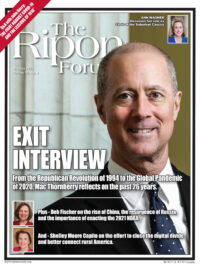 Anxiety. Stress. Isolation. Grief.
Anxiety. Stress. Isolation. Grief.
For far too long, these words have been used to describe the consequences of the epidemic of substance use disorders that has devastated communities across the country. Now, as the COVID-19 pandemic piles on the uncertainty for individuals, families, and communities, it is also threatening the progress of people with a substance use disorder (SUD) and putting others at risk of developing one.
Although we don’t yet know the full picture of the pandemic’s impact on the opioid epidemic, we do know that in 2018 the number of people suffering from a substance use disorder topped 20 million and just 11 percent of those in need of treatment were able to receive it. Since the pandemic began, more than 40 states have reported increases in substance related deaths, particularly those related to illicitly manufactured fentanyl, methamphetamine, cocaine, and heroin.
People are hesitant to seek medical treatment, including for SUD, for fear of catching COVID-19. And for many months during the early days of the pandemic, while cities and states were enforcing lockdowns, those treatment facilities may not have even been open. But no two experiences are identical. For some with SUD, social distancing may have helped keep them away from dangerous substances or harmful influences. But for others, the loneliness of isolation could make their situations much worse. The pandemic may be unprecedented, but the consequences of an economic downturn have been seen before.
Since the pandemic began, more than 40 states have reported increases in substance related deaths.
At the frontlines of both the COVID-19 pandemic and the substance use epidemic are academic medical centers, comprised of medical schools and teaching hospitals that are caring for patients while also teaching health care professionals and researching and developing effective treatments for both COVID-19 and SUD. The Association of American Medical Colleges, which represents the academic medicine community, is committed to supporting all of our members’ efforts to improve the lives of patients and the health of our nation.
As an educational psychologist, I have the honor of supporting our constituents in their efforts to practice medicine, teach, and conduct research. During this pandemic, I have not only seen the toll it is taking, but I have also seen firsthand their commitment to patient care. The academic medicine community has and continues to step up despite the challenges they are facing and those who teach doctors and the next generation of scientists and clinicians are finding innovative ways to respond to the epidemic of addiction amid the pandemic of COVID-19.
Although all of our members are teaching content related to addiction, we recently awarded grants to nine diverse institutions in particular— Arizona State University, Penn State College of Medicine, Stony Brook University, The Robert Larner, M.D. College of Medicine at the University of Vermont, The University of Florida College of Medicine, The University of Texas at Austin Dell Medical School, University of Alabama at Birmingham, Vanderbilt University Medical Center, and the Zucker School of Medicine at Hofstra/Northwell—to develop tools and resources to help advance teaching and learning in areas such as pain management and addiction.
Those who teach doctors and the next generation of scientists and clinicians are finding innovative ways to respond to the epidemic of addiction amid the pandemic of COVID-19.
The pandemic has caused these teams to rethink, realign, and reset their goals, each in different ways. But one of the unanticipated benefits is that these educational innovations, born of the unprecedented circumstances of COVID-19, can have lasting positive effects. For example, education that does not require immediate direct patient contact has shifted to remote delivery and educators and students have more fully realized the benefits of on-demand and just-in-time learning. In addition, the pandemic has called for increased attention to a broader health care team. Interprofessional learning to address a public health crisis, such as COVID-19 and the opioid epidemic, has expanded to include non-traditional members, such as the patient, the family members, and a recovery coach. These teams are learning to deliver care in new ways, such as creating online support groups to providing easier access to medications for addiction through telehealth.
In the coming months, we look forward to learning more about the work of these institutions and how their innovations will equip tomorrow’s teams to provide even more optimal care. However, we also look forward to seeing related regulatory changes such as the permanent expansion of telehealth services and the removal of the X waiver requirement for the treatment of addiction.
As we continue to face this national epidemic of addiction and a global novel coronavirus pandemic, our academic medicine community will continue to serve on the frontline. They will do so with continued conviction to treat their patient’s diseases, whether COVID-19, addiction, or otherwise. And that means they need our support now more than ever.
Lisa Howley is the Senior Director of Strategic Initiatives and Partnerships at the Association of American Medical Colleges (AAMC).




